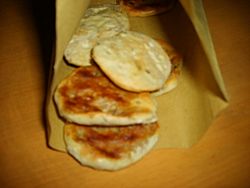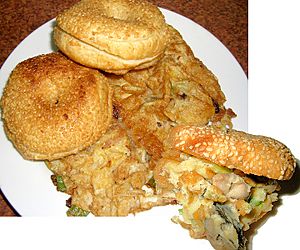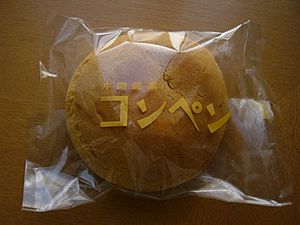Kompyang facts for kids

A kompias from Jian'ou in China's Fujian Province
|
|
| Alternative names | Kompyang |
|---|---|
| Type | Bread |
| Place of origin | Fuzhou, Fujian |
| Region or state | Fujian, Sarawak, Perak, Matsu, Ryukyus |
| Main ingredients | Flour, lard, onions, salt |
| Kompyang | |||||||||||||||||||||||||||
|---|---|---|---|---|---|---|---|---|---|---|---|---|---|---|---|---|---|---|---|---|---|---|---|---|---|---|---|
| Chinese name | |||||||||||||||||||||||||||
| Traditional Chinese | 光餅 | ||||||||||||||||||||||||||
| Simplified Chinese | 光饼 | ||||||||||||||||||||||||||
|
|||||||||||||||||||||||||||
| Indonesian name | |||||||||||||||||||||||||||
| Indonesian | kompias | ||||||||||||||||||||||||||
| Okinawan name | |||||||||||||||||||||||||||
| Okinawan | 光餅 / コンペン クンペン | ||||||||||||||||||||||||||
Kompia or kompyang is a special type of bread. It comes from Fuzhou, a city in China's Fujian Province. This tasty bread is also popular in other places. You can find it in the Ryukyus, Taiwan, and parts of Southeast Asia. This includes countries like Indonesia and Malaysia. In Malaysia, it's popular in towns like Sitiawan and Sibu. Many people there have family roots from Fuzhou. Sometimes, kompia is even called "Foochow bagels"!
Contents
The Story Behind Kompia
Kompia was named after a famous general called Qi Jiguang. This happened way back in 1563. General Qi Jiguang led his soldiers to Fujian. They were fighting against Japanese pirates. These pirates were very clever. They used sneaky guerrilla tactics. This meant they would attack quickly and then hide.
How Kompia Helped Soldiers
General Qi Jiguang noticed a problem. His soldiers cooked their meals over fires. The smoke from these fires would rise into the sky. The Japanese pirates could see the smoke. This helped them find where the soldiers were camping. The pirates didn't have this problem. They carried onigiri, which are rice balls, that didn't need cooking.
So, General Qi Jiguang came up with a clever idea. He invented a special bread. This bread had a hole in the middle. This hole was very useful. Soldiers could string the breads together. They could then carry them easily while marching. This meant no more campfires giving away their location!
A Bread Named After a Hero
Later, General Qi Jiguang won the fight against the pirates. To remember his victory, people named the bread after him. They called it guāng-bǐng, which means "Guang cake." This is how the kompia got its name and became a symbol of a clever military solution.
What's in Kompia?


Kompia is made with simple ingredients. These include flour, lard, onions, and salt. First, a ball of flour is prepared. Then, people can add other yummy fillings inside. After that, the dough is flattened with a rolling pin.
Baking the Bread
The flattened dough is then slapped onto the sides of a special oven. This is usually a traditional Chinese oven. It takes about 15 minutes for the kompia to bake. Sometimes, people put meat inside the bread as a filling. This makes it even more delicious!
Different Kinds of Kompia
There are a few different types of kompia.
- One type has sesame seeds sprinkled on top. This version is baked without any filling inside. It is known as 麻饼 (má bǐng).
- Another type is a sweet version. It is called 征东饼 (zhēng dōng bǐng). This name means "Conquest of the East cake." For this sweet kompia, sugar is used instead of salt in the dough.
See also
 In Spanish: Kompyang para niños
In Spanish: Kompyang para niños
 | Claudette Colvin |
 | Myrlie Evers-Williams |
 | Alberta Odell Jones |

